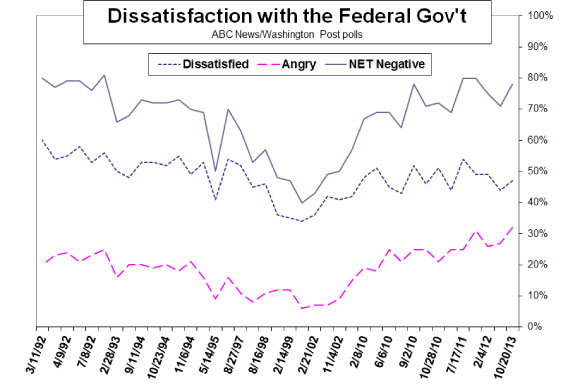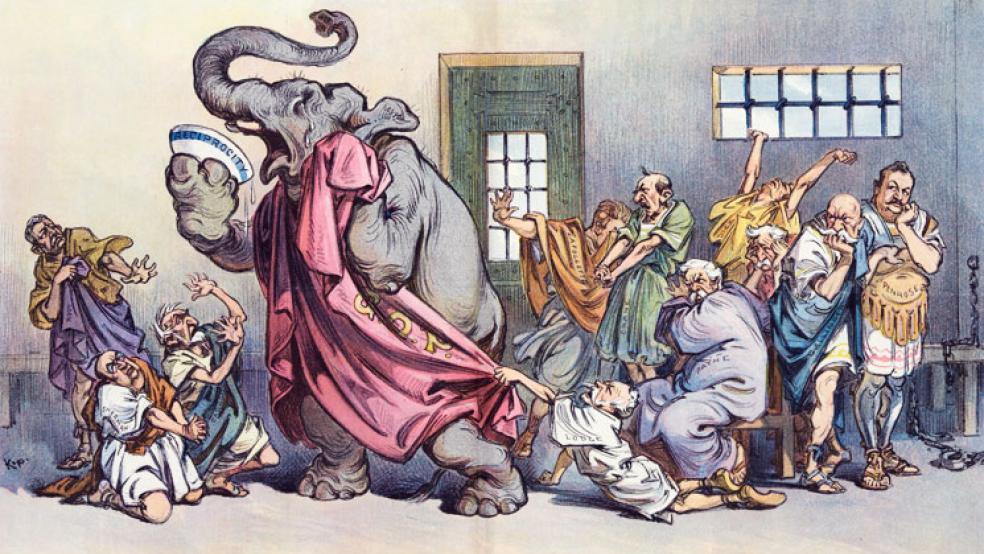Last week I explained that Congress has become an incompetent institution, unable to do its most basic work of passing annual appropriations bills to keep the government running. We usually think of incompetence as being the result of ineptness, stupidity or ignorance. But in the case of Congress, it is often intentional and deliberate, part of a long-term strategy by some Republicans to undermine government itself.
Former Republican congressional staffer Mike Lofgren first alerted me to this phenomenon two years ago in a widely discussed article, “Goodbye to All That: Reflections of a GOP Operative Who Left the Cult.” In it, he discussed the tactic of filibustering all legislation in the Senate and all nominations to administration positions, regardless of merit. In Lofgren’s words:
A couple of years ago, a Republican committee staff director told me candidly (and proudly) what the method was to all this obstruction and disruption. Should Republicans succeed in obstructing the Senate from doing its job, it would further lower Congress's generic favorability rating among the American people. By sabotaging the reputation of an institution of government, the party that is programmatically against government would come out the relative winner.
A deeply cynical tactic, to be sure, but a psychologically insightful one that plays on the weaknesses both of the voting public and the news media. There are tens of millions of low-information voters who hardly know which party controls which branch of government, let alone which party is pursuing a particular legislative tactic. These voters' confusion over who did what allows them to form the conclusion that "they are all crooks," and that "government is no good," further leading them to think, "a plague on both your houses" and "the parties are like two kids in a school yard." This ill-informed public cynicism, in its turn, further intensifies the long-term decline in public trust in government that has been taking place since the early 1960s - a distrust that has been stoked by Republican rhetoric at every turn ("Government is the problem," declared Ronald Reagan in 1980).
An ABC News/Washington Post poll out this week confirms that the strategy is working.

I recalled Lofgren’s statement on Wednesday when I saw that House Ways and Means Committee Chairman Dave Camp (R-MI) blasted the Internal Revenue Service for delaying the 2014 filing season by two weeks. Said Camp, “There is no reason the IRS should not be able to do its job on time.”
The IRS explanation for the delay, however, is both understandable and believable—it is because of the 2-week government shutdown that Camp’s party petulantly undertook a quixotic effort to repeal the Affordable Care Act, which was enacted 4 years ago and took effect on October 1. As the IRS patiently explained, the government closure came during the peak period for preparing its systems for the new filing year, which begins in just a few weeks.
Thus we see a perfect example of what I will henceforth call the Lofgren Corollary to the definition of chutzpah. Chutzpah, of course, is a wonderful Yiddish word for someone with massive nerve, the classic example being the child who murders his parents and then asks the court for mercy on the grounds of being an orphan. The Lofgren Corollary refers to Republicans who intentionally sabotage government programs by denying them adequate resources and then complain that the programs don’t work, thus justifying further reductions in resources leading to more problems. The goal is to ultimately abolish the program on the grounds of being ineffective.
RELATED: GOP EXPERTS SPECULATE ON THE FUTURE OF THE PARTY
Of course it always helps if you can also deny the government agency administering a program a permanent leader, as Republicans in the Senate have routinely done during the Obama presidency. This forces agencies to operate on “automatic pilot,” unable to move forward and deal with issues arising within its jurisdiction, thus leading to problems that justify abolition of the agency and the programs it administers.
Another tactic is to make sure that an agency never knows exactly what its budget is. In the last three years, virtually every agency of government has had to deal with wildly fluctuating estimates of how much money it will have to spend, owing to various budget deals, sequestration and Congress’s unwillingness to pass regular appropriations bills, not to mention the constant threat of a government shutdown.
Right now, every agency is operating under a “continuing resolution” that expires on January 15. A “CR,” as it is called, simply allows agencies to spend at the previous year’s rate without any adjustment for inflation or changes necessitated by new laws or changing circumstances. This means that programs that should be cut continue to operate even as those that desperately need funding are deprived of adequate resources.
Once one understands the Lofgren Corollary, it is very easy to implement in a variety of situations—as long as one cares nothing about the proper functioning of government. With the sole exception of national security, with which they are obsessed, Republicans think many government programs are worthless and deserving of abolition or at least massive cuts. They disdain examining programs individually and assessing their effectiveness for fear that they might discover they have value.
RELATED: MORE SHUTDOWN FALLOUT FOR THE GOP IN THE SENATE
One of the big concerns for Republicans is that they agreed to slash all programs equally through a sequester in 2011, including the national security programs they believe are essential. A further cut of $52 billion in defense programs is scheduled for January unless the sequester is changed or abolished.
Democrats hope to use the threat of additional defense cuts to finally get Republicans to negotiate in good faith on the budget. Democrats hope for a deal that will increase both defense and domestic spending above that scheduled under the sequester, raising additional revenues through loophole closings to keep the deficit on a downward path. Treasury Secretary Jacob Lew laid out this strategy in a speech to the liberal Center for American Progress yesterday.
It is too soon to say what will happen in January. Hardliners such as Senator Ted Cruz of Texas openly talk about another government shutdown unless spending is slashed, even though the deficit has fallen 60 percent since 2009. Republicans continually play on the public’s ignorance of this fact. According to a September 26 Bloomberg poll, 59 percent of people incorrectly believe the deficit is rising versus just 10 percent who know that it is actually falling.
Whatever happens, we can be sure that Republicans will continue to operate on the basis of the Lofgren Corollary—at least until there is another Republican president.






